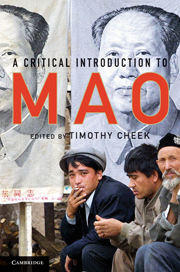Book contents
- Frontmatter
- Contents
- List of Illustrations
- About the Contributors
- Preface
- Acknowledgments
- Timeline of Twentieth-Century China
- Maps
- Part I Mao's World
- 1 Mao, Revolution, and Memory
- 2 Making Revolution in Twentieth-Century China
- 3 From Urban Radical to Rural Revolutionary: Mao From the 1920s to 1937
- 4 War, Cosmopolitanism, and Authority: Mao from 1937 to 1956
- 5 Consuming Fragments of Mao Zedong: The Chairman's Final Two Decades at the Helm
- 6 Mao and His Followers
- 7 Mao, Mao Zedong Thought, and Communist Intellectuals
- 8 Gendered Mao: Mao, Maoism, and Women
- 9 Mao the Man and Mao the Icon
- Part II Mao's Legacy
- Appendix: Selected Further Readings (Annotated)
- Index
- References
7 - Mao, Mao Zedong Thought, and Communist Intellectuals
Published online by Cambridge University Press: 05 August 2012
- Frontmatter
- Contents
- List of Illustrations
- About the Contributors
- Preface
- Acknowledgments
- Timeline of Twentieth-Century China
- Maps
- Part I Mao's World
- 1 Mao, Revolution, and Memory
- 2 Making Revolution in Twentieth-Century China
- 3 From Urban Radical to Rural Revolutionary: Mao From the 1920s to 1937
- 4 War, Cosmopolitanism, and Authority: Mao from 1937 to 1956
- 5 Consuming Fragments of Mao Zedong: The Chairman's Final Two Decades at the Helm
- 6 Mao and His Followers
- 7 Mao, Mao Zedong Thought, and Communist Intellectuals
- 8 Gendered Mao: Mao, Maoism, and Women
- 9 Mao the Man and Mao the Icon
- Part II Mao's Legacy
- Appendix: Selected Further Readings (Annotated)
- Index
- References
Summary
It has been said that Mao Zedong always disagreed with his intellectual comrades. In his career, he clashed with many leading revolutionaries in terms of ideology formation and/or policymaking. He caused irreparable damage to educated revolutionaries through his anti-intellectual stance. By looking into his ideological development, culminating in what is conventionally dubbed “Mao Zedong Thought,” I argue that despite his conflicts with many communist intellectuals, Mao shared with them similar concerns and ideas. In so doing, I shall analyze his theorization about the role of communist intellectuals in the Revolution. This dimension is chosen for two reasons. First, it is most germane to Mao and his colleagues because they always assumed that they were members of this coterie. And second, Mao and other communist thinkers drew on their experiences to contemplate what they as the educated revolutionary elite should do in order to accomplish their mission of revolutionizing China. As a result, Mao's discussion on revolutionary intellectuals reflects the themes defining Mao Zedong Thought.
This chapter is divided into three sections. First, to show that communist intellectuals laid the foundation for Mao Zedong Thought, I shall examine the ideological milieu of the communist Revolution: I focus on how revolutionary intellectuals contemplated their own role in the Revolution generally and in the rural Revolution especially in view of Mao's largely rural career.
Information
- Type
- Chapter
- Information
- A Critical Introduction to Mao , pp. 169 - 195Publisher: Cambridge University PressPrint publication year: 2010
